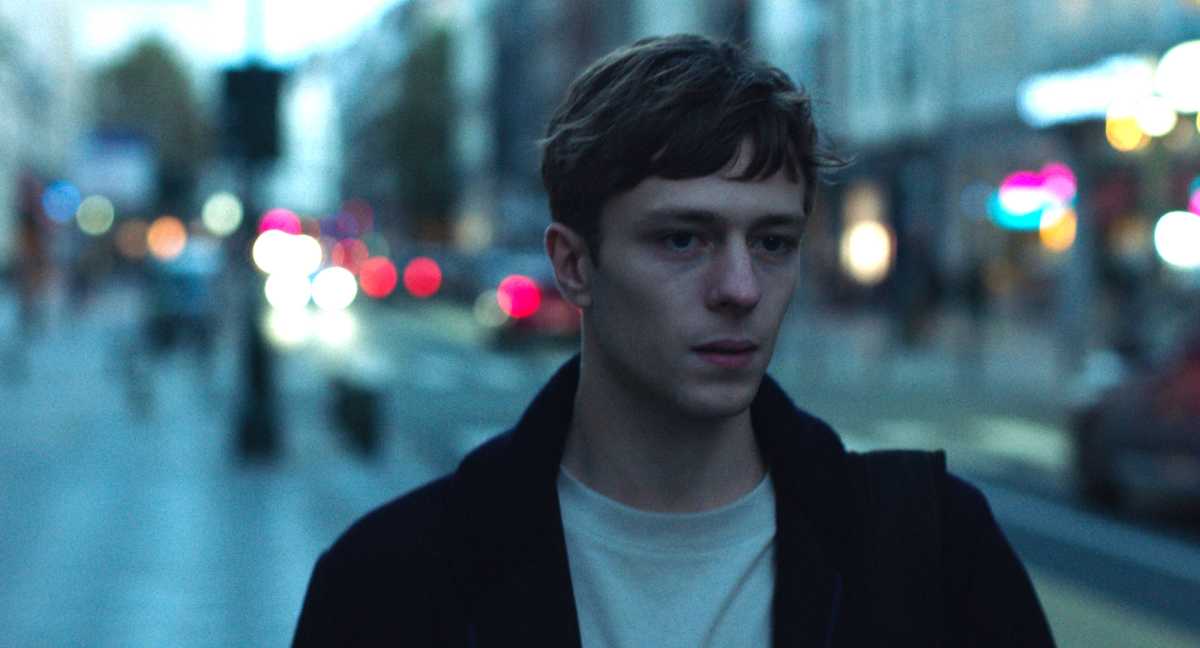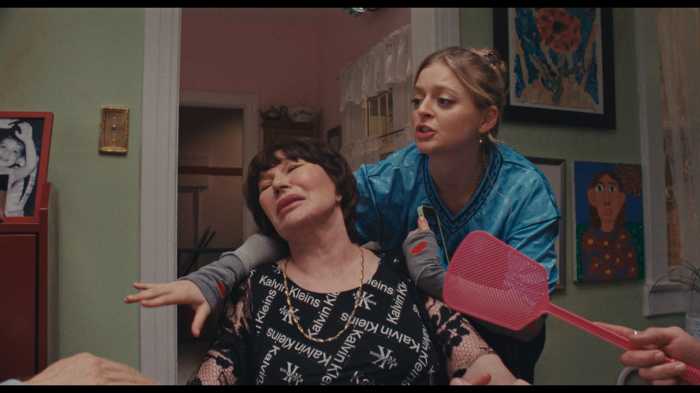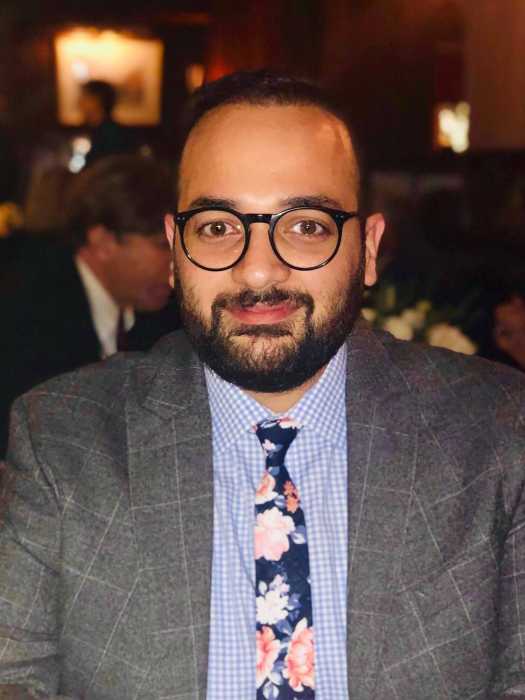The excellent character study, “Sebastian,” has Max (Ruaridh Mollica), a writer, secretly working as Sebastian, an escort. He is performing sex work as research for a novel he hopes to publish. Of course, his side hustle (no pun intended) distracts from his freelance work for a magazine, and it is only a matter of time before his two worlds collide. Writer/director Mikko Makela keeps “Sebastian” interesting because of how Max handles the personal and professional conflicts he faces. Is he being self-destructive and feeling shame about living a double life? As he gets more involved with his client, Nicholas (Jonathan Hyde), is Max getting too deep into his work? Mollica’s high-wire performance blurs the lines — he is sexy and confident one minute, and full of anxiety the next.
While in New York for NewFest Pride, Makela spoke with Gay City News about making “Sebastian.”
There is an acknowledgement in the film that sex workers are stock characters in queer literature (and film). How did you bring a freshness to “Sebastian”?
It was really important for me to approach the topic of sex work in a completely nonjudgmental way — not bringing any moral question to it. Not thinking that there has to be some kind of trauma behind his decision to do sex work or that it would lead to trauma, either. That was the first important step. Then, I really wanted to look at this phenomenon of sex work facilitated by technology. In my encounters with the queer community in London, many people I know have been involved in sex work more or less casually or professionally. It is through apps and the internet that has made it so simple for someone to cross that boundary and dip their toes into sex work. I wanted to look at that and how it has become so common for a large swath of young queer men — looking at it perhaps as another option of the gig economy in a modern metropolis. I would hope as well that the film’s other big focus on the creative process and writing is something we haven’t really seen in a sex worker story before.
Max does first-hand research into sex work but lies that he has interviewed sex workers. What did your research entail and what about your actors and how they performed?
I know a lot of sex workers who I have interviewed and had discussions with. I watched documentaries and other films and reading articles about it. It was important for me to make it feel very lived in and authentic. I tried to get the details right. Ruaridh, to my understanding, didn’t go through that kind of research process himself because he felt it is so much about this character’s journey as written in the script that to infuse it with information from other sources would dilute it in some way. Of course, the big question that is implicit in the film — relating to the idea of research as well — is whether an audience’s enjoyment of the story or of a film or piece of art is predicated on the knowledge that the author or actor themselves are drawing on their own experiences. Where did they get that information? That is an interesting question that I am trying to ask with the film as well.
There is a fantasy, a reality, and a performance in sex work, and “Sebastian” captures all of that brilliantly, often in a single scene. Can you discuss that layering of emotion? What he has to do, what the client wants, and how he has to process it for my purposes. He is constantly recalibrating his experiences.
That’s so much what I was trying to get at and capture—the idea of looking at himself from the outside as well—that participant/observer split. Will he be willing to go further into a situation because he knows it will potentially lead to further material for his work. But also reversing that question: Would you live your life in a different way in order to be able to write about it, or is there a part in Max/Sebastian choosing a taboo subject in order to have the license to live it because it is for a higher purpose in a way.
Can you talk about depicting the sex work and what you wanted to show, how explicit it would be and getting into the mindset of being in this very intimate space? He is initially passionate but over time he feels more contracted and jaded.
I wanted each scene to yield new insights into his character and his character’s journey. Every sex scene is there to tell the story of his foray into it. Like you said, getting deeper into it. The point when he is no longer in control; he doesn’t try to leave [a fraught] situation. He is a very resilient character. I wanted to depict the idea of a loss of control in the sense of this scheme he devised is no longer working in the way he wanted. It’s very much about where the previous encounters have empowered him; this is the client at which it is no longer empowering him.
The film doesn’t have an overwhelming sense of danger in the sex work he does; it’s more about the emotions Max experiences doing sex work.
The dangers are to his emotional life and getting himself very deep into this, for lack of a better word, scheme. There are dangers in his developing feelings of guilt — is he using these people? And of course, in a way, he is. When he has developed a deep and meaningful connection with Nicholas, he has these feelings of guilt and ulterior motives.
Max is very self-destructive. He feels shame about what he is doing but claims the sex workers he knows do not. Can you talk about his character and the conflicts he is experiencing? His relationship with Nicholas is almost fatherly.
Max has a naivete; he thinks he knows what sex work is, and he is surprised by the emotions that he feels, and the tenderness he begins to feel towards Nicholas as well. There is a suggestion that he’d like to stay, that it does develop into a companionship that goes beyond the clock. But I also didn’t want to depict them as ending up together and Max stopping sex work. Nicholas is a pivotal figure on Max’s journey, but it is Max’s journey.
Do you think Max is a “wholesome boy next door who is all filth underneath” as one character suggests? What qualities did you imbue him with?
I think he is full of contradictions — in his own eyes as well. He knows himself less well than he thinks he does. He has to discover things about himself. I read a comment on the film online as one does, and someone pointed out that they had never seen a character who has extreme opposites of being very controlled and guarded and more subdued in his daytime life as Max, and then taking on a very sexually confident persona. I think it comes from within him. I also wanted to use the character as a way to think about this body/mind split as well, and that is what he needs to work out for himself as well. He perhaps feels these two sides of himself are maybe incompatible, or he really has trouble forging them into a whole.
Does Max know why he is doing this? You suggest he knows himself less well. He justifies his sex work as research, but he is also combatting his loneliness and living vicariously through his clients and their experiences.
I think he has an inkling of the reasons, but it is about his feelings of shame that he wishes he didn’t feel. The difficulty for him is being able to say he is interested in doing sex work without having to tie it to an artistic pursuit. He is in this constant battle with himself, I suppose.
“Sebastian” | Directed by Mikko Makela | Opening August 2 at the IFC Center | Distributed by Kino Lorber.





































